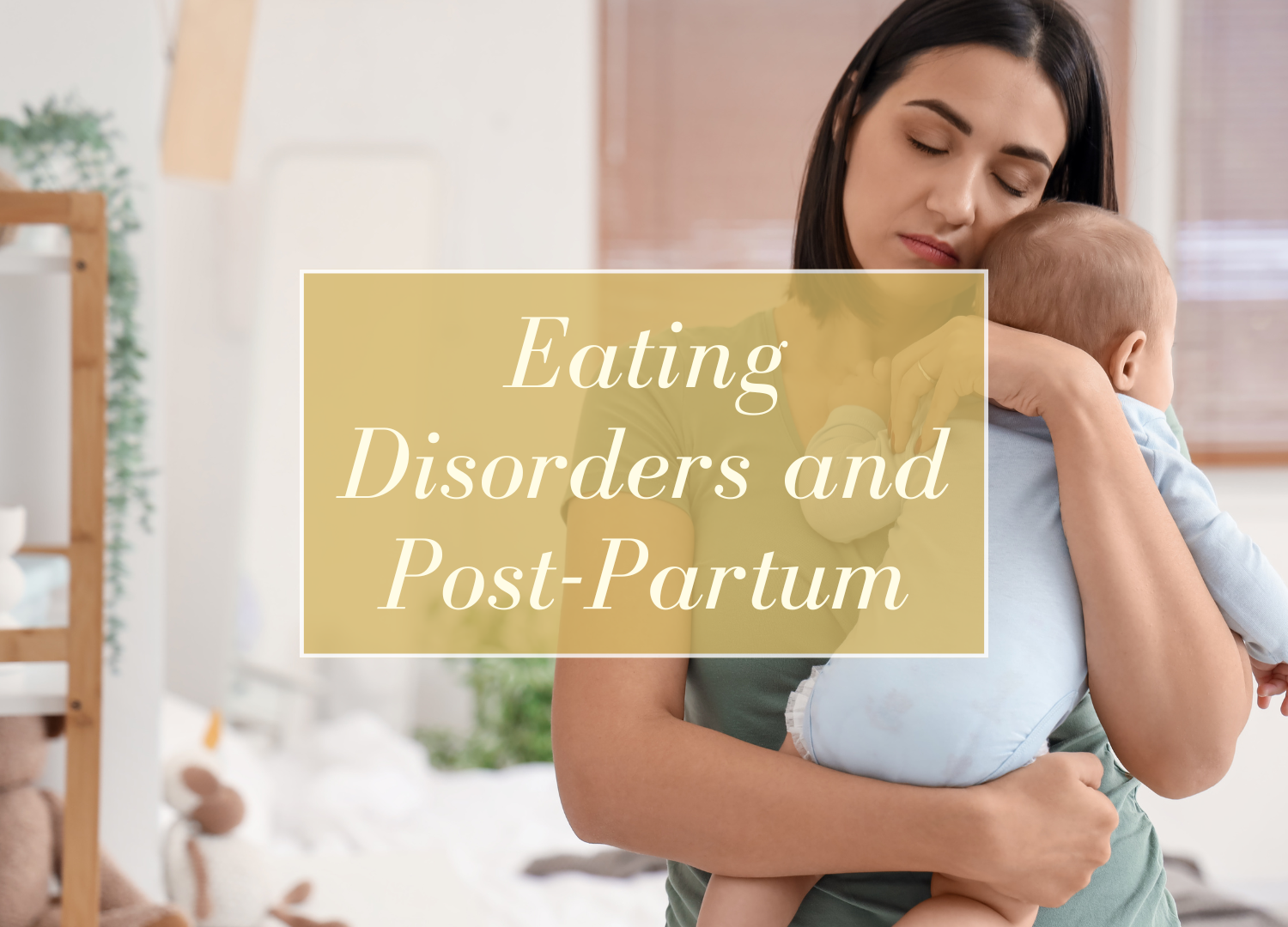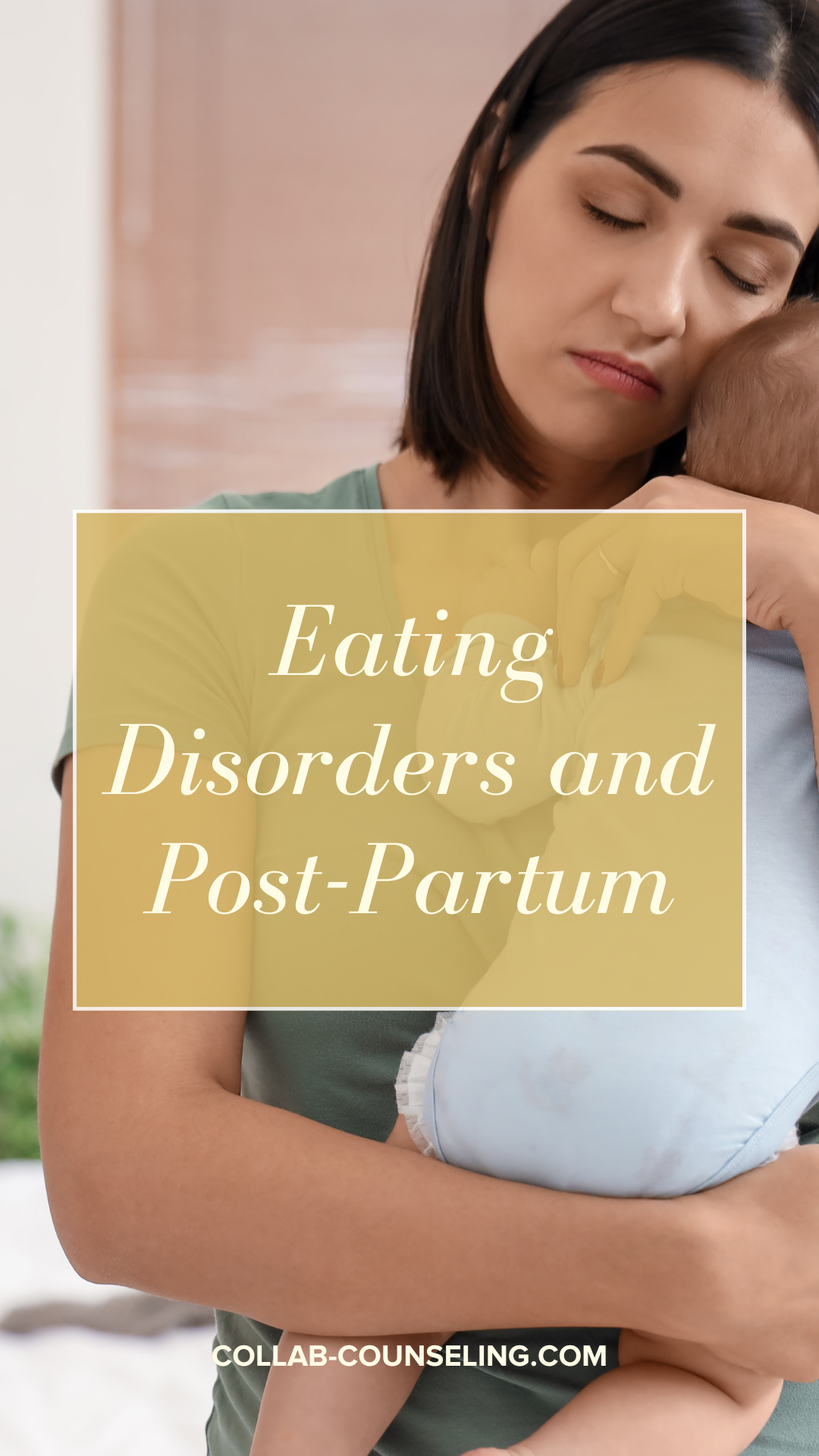Navigating Postpartum and Eating Disorders: Finding a New Balance
Navigating postpartum can be incredibly difficult. If you are someone who struggles with an eating disorder, postpartum can present even more challenges. Today, we are hearing from one of our therapists, Michelle Butler, LCSW, about the silent struggle many mothers face—and why you’re not alone. Take it away, Michelle!
Pregnancy is often portrayed as a time of glowing skin, growing bellies, and anticipation—but what comes after can be far more complicated, especially when it comes to a mother’s relationship with her body and food.
For many women, the postpartum period brings emotional upheaval, hormonal shifts, and an entirely new identity. It’s a time of physical recovery, sleep deprivation, and learning how to care for a newborn—yet few people talk about how all of this can interact with something even deeper: disordered eating.
The Hidden Crisis: Postpartum & Eating Disorders
Eating disorders don’t pause for motherhood. For some, pregnancy can feel like a temporary break from body scrutiny, but after the baby arrives, that scrutiny can return with full force—both from within and from outside. The pressure to “bounce back,” to fit into pre-pregnancy jeans, or to reclaim a “before baby” version of oneself can be overwhelming.
For others, motherhood may trigger or exacerbate pre-existing issues around food, control, or self-worth. In fact, research shows that the postpartum period is a high-risk time for the onset or recurrence of eating disorders like anorexia, bulimia, and binge eating disorder. Food and body noise can increase and feel out of control as there are multiple transitions happening at the same time.
Why the Transition Is So Hard
The postpartum period is marked by radical change. You’re healing from childbirth, navigating identity shifts, and learning how to care for a tiny human. You may feel like your body isn’t your own anymore—touched, needed, changed.
Combine this with the loss of routine, lack of sleep, and potential postpartum depression or anxiety, and it’s easy to see how disordered thoughts or behaviors around food and body image can creep in or intensify.
Some common postpartum struggles related to eating disorders include:
Body dysmorphia after pregnancy
Guilt or shame around eating or body image
Obsessive exercise to “get the body back”
Comparison to others online or in real life
Overwhelm and using food to cope
You Are Not Alone
If you’re struggling, know this: you are not alone, and it’s not your fault. The expectations placed on mothers—by society and ourselves—are often unrealistic and harmful. Your worth is not defined by the number on a scale or how quickly you "recover" your body.
It’s okay to grieve your pre-baby body while also honoring the strength it took to grow and birth a human. It’s okay to feel lost in your new identity. And it’s okay to need help.
Gentle Practices to Foster Balance After Baby
Recovery and healing in the postpartum period aren’t about getting “back” to anything. It’s about moving forward, creating a new balance, and being gentle with yourself. Here are thoughtful, actionable ways to begin:
1. Reconnect with Your Body’s Signals- Let Curiosity Lead
When you feel ready, let curiosity lead. Notice what physical hunger, fullness, and satisfaction feel like. Explore what foods offer both nourishment and comfort, without labeling them “good” or “bad.”
2. Anchor in Mindfulness
Between diaper changes and feeding sessions, pause—even just for a few breaths. Notice your emotions, your body’s needs, your heartbeat. Such moments bring calm and help you anchor in the present.
3. Unpack Expectations—Especially Your Own
What messages do you hear about how “a mother should look”? Where do they come from? Begin to separate these narratives from what truly serves you and your well-being. Maybe unfollow social media accounts that promote "bounce back" culture. Instead, seek out real, body-positive motherhood stories.
4. Enlist Compassionate Support
You don't have to walk this path solo. A therapist who specializes in eating disorders and postpartum issues who understands postpartum nutrition challenges, a body-wise dietitian, or a peer group can offer rest for your mind and strength for your heart.
5. Explore Nourishing Self‑Care Your Way
Well-being isn’t just about food. Gentle movement, restorative rest, creative outlets, and skin-to-skin time with your baby all contribute to holistic healing. You get to choose what self-care looks like for you.
Wrapping This Together
Recovery and postpartum nourishment aren’t about reverting to who you were—but about embracing who you are becoming. It’s an invitation to honor the miracle your body has achieved, while tending to your evolving needs with kindness, wisdom, and agency.
At Collaborative Counseling & Nutrition, our committed team collaborates with you—drawing from decades of experience—to walk this path together. Your healing, in all its complexity, is worthy of care, empathy, and truth.


